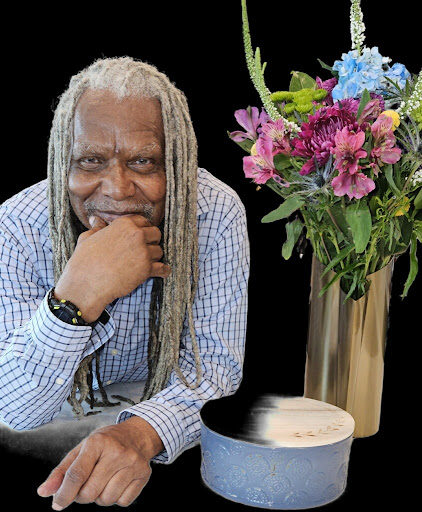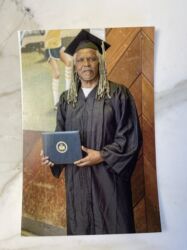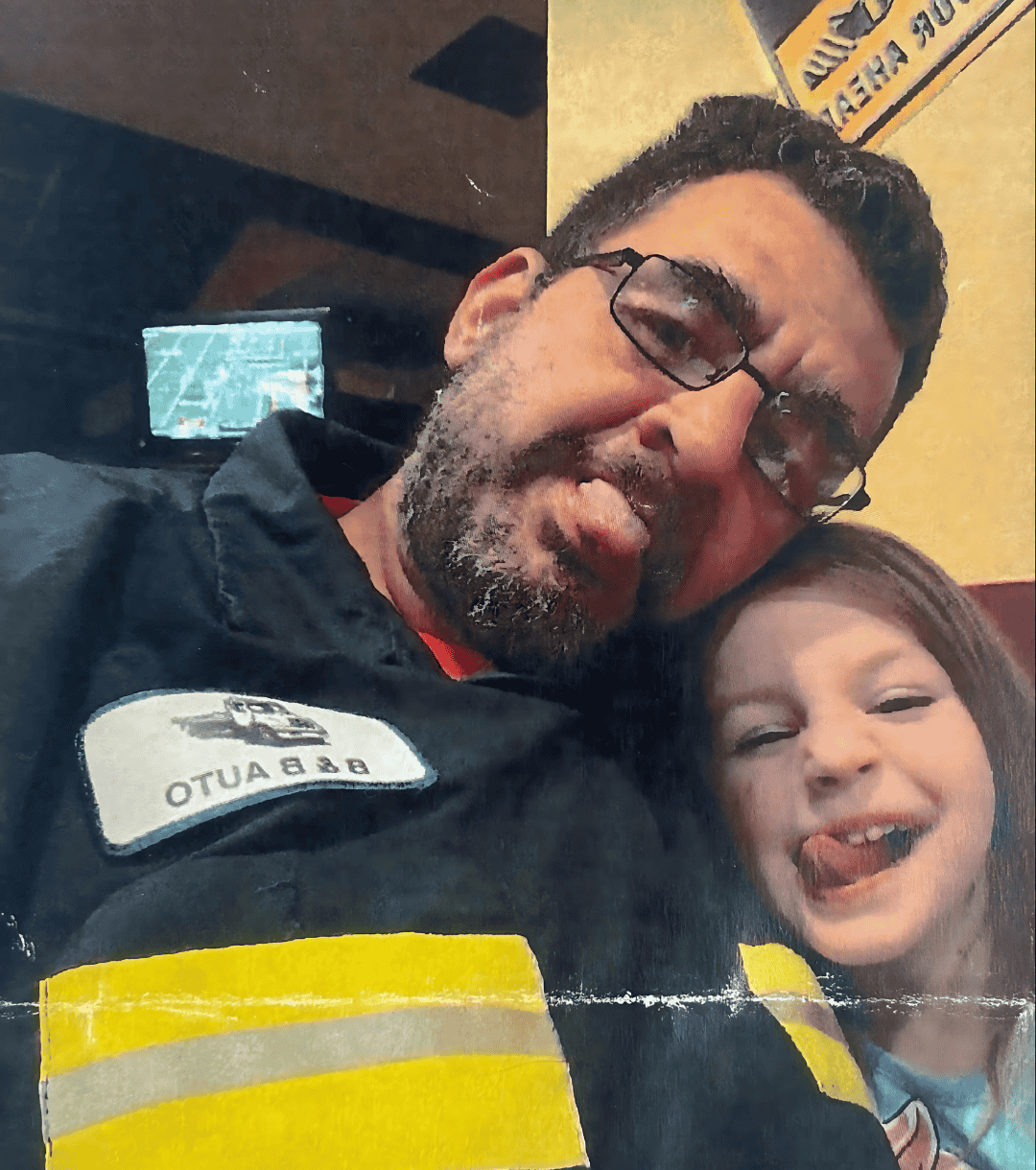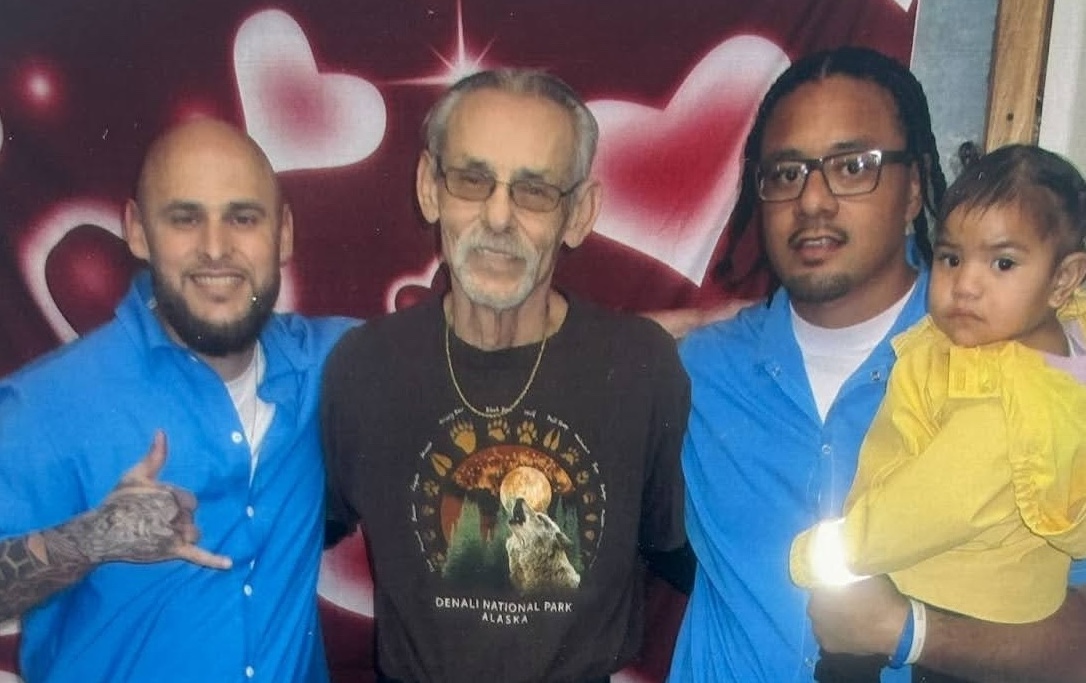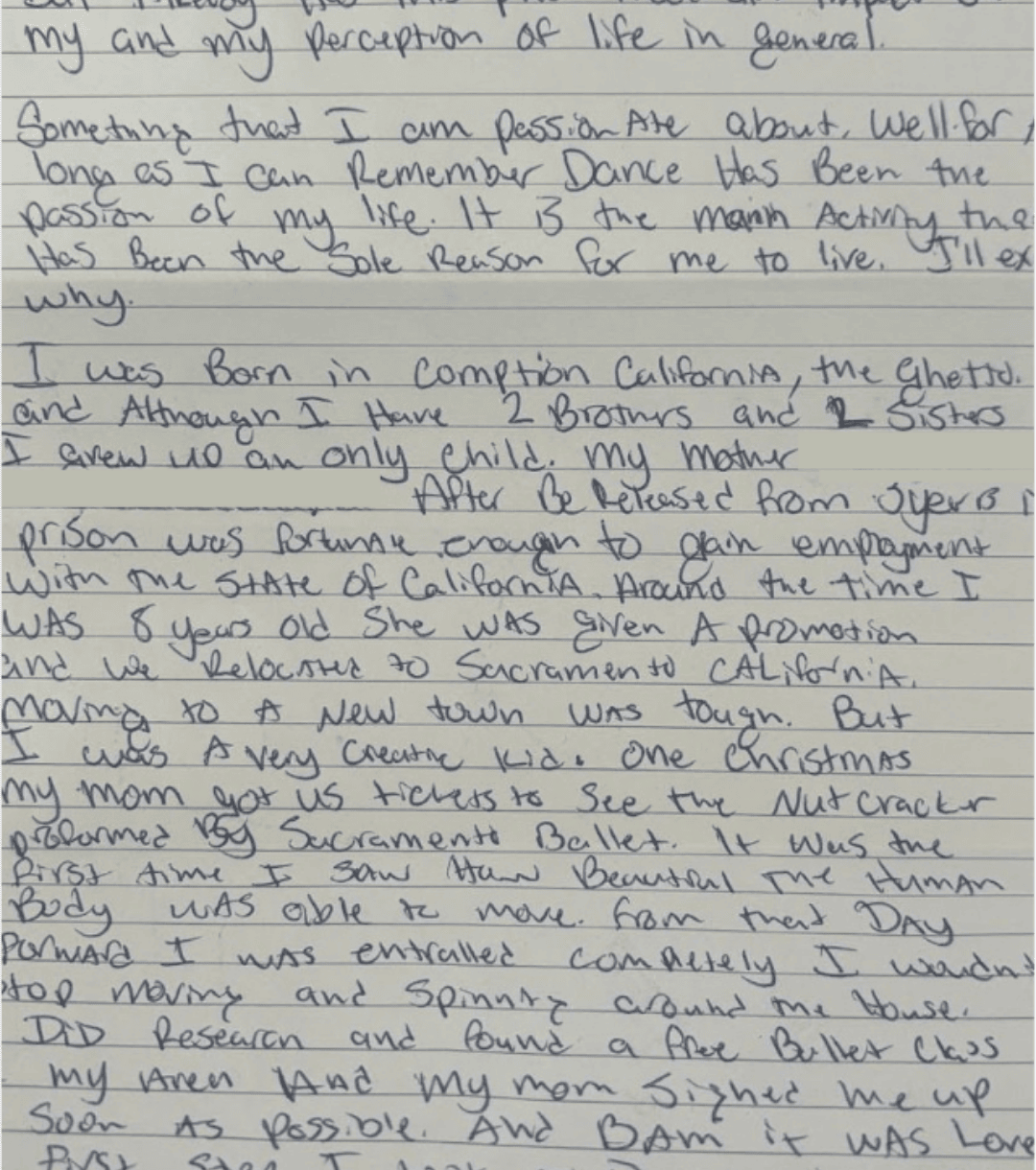Diane: Tell us about your parole board hearing?
Gerald: Most of the guys told me that since it was my first time going to the board, there was a 99% chance I won’t be found suitable. When I did get there, I found out they were going to ask me the type of questions where you don’t want to show too much body language because they’d see that as you being aggressive or something. I sat there and remained calm. They asked questions I wasn’t comfortable with. They came with bullets. I was prepared for them, but I didn’t believe that they’d ask them. In the end, they said that in 25 years I’d done so many things such as my degree, programs, work-studies, 3D machining and my art. Unfortunately, I thought I was a model system on the outside, but they said I was a model citizen on the inside.
Diane: Were your victims present?
Gerald: Yes, after being interviewed, they let the victim’s family speak. They really didn’t want me to be paroled. The sister didn’t think I should ever get out of prison. The whole time I was being interviewed by the board, she made it clear that she didn’t want me to have any form of concentration. She did everything she could to distract me from answering any questions. I was aware of what she was doing, but I didn’t react to it. When his daughter spoke, that’s one of the things that really got to me. If the situation had been reversed, and it were my daughter speaking on my behalf… I was trying not to have any reaction, but as soon as she started talking about her father and how much he meant to her and how that part of her life is not being fulfilled… The tears started coming to my eyes because I realized what I had done more so than before. It was unexpected that I would have been that deep into the whole board.
Diane: Had you ever talked to her before?
Gerald: No, I never even knew who they were. I didn’t know what to expect. I didn’t know anyone would be there from his family. Even when they went to recess, came back, and said I was found suitable, I was almost in shock. All that time I had no reaction. My attorney said I sat there for about 3-4 minutes. Then she got excited and said, “Mr. Gerald, they found you suitable! You’re going home Mr. Gerald! Why are you sitting there? Get up!” They actually thought I had done enough to be released. I was in shock- there was no joy or anything. It was as if they had something like, “The sky is blue.” I can’t even explain it.
Diane: Was there any reaction from the victim’s family?
Gerald: No, they just sat there on the monitors. Even right now while I’m talking to you, it’s like I’m reexperiencing the whole thing.
Diane: What happened next?
Gerald: I started talking to other people who were going to go to the board because there were a lot of guys that have a theory about it. I immediately told them not to go in there without understanding what they’ll be asked. If they are asked some questions that they don’t have answers to, they might as well not go. I told them not to go in there with any attitude or like the board owes them anything. The handful of guys I had spoken to were found suitable, too.
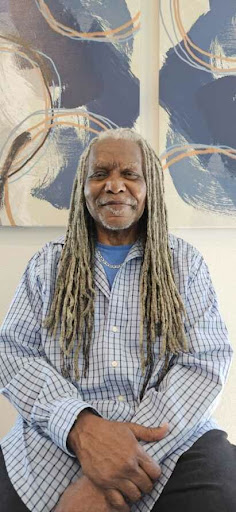
Diane: With all the internal and external work you have done, it shouldn’t have taken you 25 years to be released.
Gerald: I basically told the judge at my trial that I wasn’t going to do any 40 years to life. I said, “You might as well give me the death penalty because I’m not going to do it.” And I had made up my mind that I wasn’t. When I arrived at San Quentin, in reception, they put me in the Badger Housing Unit on the 5th tier. There was a guy who always saw me looking over the tier. He walked up to me and said, “Whatever’s on your mind, if you do jump, nine times out of ten, you may die. But that 1/10 chance that you live, you’ll be all broken up and still have to do the time.” So I made up my mind and said I don’t really want to do that if there’s going to be pain involved. For about a week I kept thinking about how I could do it without any pain. A week later the same guy came up to me and told me, “Hey, I could get you a fix- something pure. You could just lay down and go to sleep. I only ask that I can use half.” I looked at him and said, “I have never used drugs in my life, and I’m not going out like that.” So he walked away. That week I was still preoccupied that I’ll be doing this for forty years. I saw him in one of the quarters and said, “Can you get me some heavy tape and one of the big plastic bags?” He said, “Yeah, give me a can of Bugler and I’ll have it for you within the hour.” I went into the cell and didn’t say anything to my cellie. He was on the top bunk. I took the tape and plastic bag, put it over my head and wrapped the tape around my neck, pulled the blanket over my head, and layed there. Everything was going perfectly. There was no pain. But then, all of the sudden, I ran out of air. I started tearing it off. I took some deep breaths and said that this is not going to work. The next day, I called my sister and told her what I had done. That’s when my whole life changed as far as prison goes. She told me, “What you did, you killed somebody. All that family asks is that you pay your debt to society and their family. Now you’re being selfish. Your life doesn’t belong to you anymore. Your life now belongs to your kids, family, friends, and people that love you. Quit being mad and stand up and do whatever amount of time you’re told to do. I’m tired of hearing about how selfish you are, and I’m letting you know that if you don’t know that you’re being selfish to everybody, now you know.” That’s when I made up my mind that I was going to make the best of the program, do whatever it took to get my time over with and get out. People kept telling me the laws would change, and they did. I never filed for an 1170 or anything like that, but they contacted me and said I’m elderly. I didn’t expect anything out of it, but here I am today. I still hear my sister’s voice- she passed eight years ago. I did what she asked. I gave what was requested by society. She made sure that I know how much they love and need me because they were doing their time with me. I didn’t even know that until I actually got out and was able to speak to them for her. Now I’m not only a father, but a grandfather. I’ve got five girls that love me. That’s where I am today. I wish I could be in contact with the guys on the inside because they supported me psychologically until I was able to go through that journey and come out on a brighter end.
Diane: Was there a time that you felt you were rehabilitated?
Gerald: Not really, because I never allowed myself to be institutionalized. I did my job just like the COs had to do their job. Just like you have bad COs and bad inmates. I just tried to maintain a rapport with the people who gave me the same respect that I gave them. I didn’t even like to go out of the cell because I didn’t know anybody… I was a union rep for the post office, and I used to bring my boat up to San Quentin. I had 10 or 15 people on board. One day I pointed to San Quentin and said, “That’s where all the bad people live.” When I showed up at the front gate, I was shaking, I couldn’t believe I was getting ready to enter. One of my cellies said, when we moved in together, “ I see what you’re doing, you’re going to have to go out there because those are just other people. You’re going to have to go in the yard, find a spot to sit by yourself, and observe individuals. Then, you start picking out your perimeter of individuals that you could feel comfortable with.” So I did that the next day. I sat there for like three hours. I found a group of guys who were playing dominos. I kept doing that. I didn’t care if he was a gang member or what. If you were doing the right thing, you knew the job was to do the right thing, my job was to do the right thing, then it wasn’t going to be that bad. The bad thing was I couldn’t leave when I wanted to. I worked on it, and it got me through. I still do the same thing now in this house. The first thing I did was look at a person that I saw I could have a good rapport with and I said, “Hey, we’re going to be in this room together.” I still do the same thing I did on the inside, on the outside.
Diane: Tell me about the first day you were out.
Gerald: They tried to keep me! The day before I was supposed to walk out of there, they told me I tested positive for Covid and took me to what I call “the hole” the adjustment center. I asked what I was supposed to do because I was supposed to go out on parole. They said they’d probably get me a motel room. They asked me if there was anybody I knew that I could stay with or who could get me a room because the state wasn’t going to pay for it. They had in the past, but now they wouldn’t. My daughter stepped up and found a place for $118 a day. She also had three covid tests, which she gave to me, and they all came back negative. They wouldn’t test me again at the prison for another 30 days. I knew I didn’t feel like I had covid and it was a false positive. Anyway, my parole officer and my daughter talked and I stayed at the hotel. Finally, she told me if I’m not positive, they’d just take me to the halfway house. So that’s how I got there without staying at San Quentin for thirty days in the adjustment center. So, I was cool and felt good when I walked out. Mindy, my reentry transition support person met me on the outside, gave me my phone and made sure I was happy with my living situation. She had done a lot of writing and paperwork for the board. She was like my right hand woman.
Diane: Who met you at the gate?
Gerald: Mindy and my daughter.
Diane: How did it feel getting in a car?
Gerald: I was used to riding in cars and stuff. I recently had prostate cancer, so I had to be driven for six weeks to a healthcare center where I got my radiation treatment. The cars look like they’ve been cut from a cookie sheet. They don’t have character anymore. They’re just “cars.” With the exception of the electric ones. I rode in an electric car days ago. I didn’t even know it was electric! The whole time I thought it was a regular one. It even sounded like one. I asked, “Does it have any horsepower?” and he hit the throttle. It surprised me. I’ve got to get me one of these!
Diane: What was your first meal?
Gerald: Chick-fil-a. I could have been happy with just the fries and the lemonade. I was concentrating on eating them one at a time because they tasted so good. I learned instantly that after living on the mystery meals at San Quentin, I am still trying to adapt to eating real food.
Diane: What’s your favorite thing to eat since you’ve been out?
Gerald: I went to a place right here in Fairfield for breakfast and the food was excellent. I think it’s within walking distance from where I am right now. The price was right, that was my favorite part.
Diane: Tell me about your first night in a real bed.
Gerald: The first night in a hotel was nice. The bed wasn’t the main thing though. It was not having to shower in the village butthole. That was the thing! I was in the room all by myself for two days, and the bathtub… I just couldn’t get enough of that. I went to a church and that was a shock. It was like a production. They had the band in a bulletproof, glass room. Big screen TVs on the ceiling. Big commercial camera screens everywhere. Some people came with their Sunday best on, I was able to go in my jeans like some of the other people. It felt comfortable: come as you are. When I sat there, I was able to adjust to my surroundings to the point where I could actually feel the spiritual part of the church. Before I knew it, there were tears in my eyes. That was nice.
Diane: Where are you staying?
Gerald: I just moved from one house to another today. At the other house, I got along with everybody, but they were doing too much. It got to the point where I could see it being a place where I might wind up going back to prison. So I moved to this other house. Five guys that live in the house, three bedrooms, and it’s real quiet. Everybody doing their part, keeping things clean and neat, sharing their food and stuff. It’s just comfortable. The house is near GEO where I volunteer, so I walk around the corner to their office and help out any way I can.
Diane: How long can you stay there?
Gerald: I can stay here for six months, and a year if I don’t have anywhere to go. That’s the thing. My family is playing tug-of-war over me right now. My son and his wife just had a brand new house built in Stockton. They told me not to worry about a car; they’re going to put a BMW in the garage for me. Then I got to do a psychological evaluation with him. I’ve been away for 25 years. He has to get to know who I am while I’m getting to know who I am. My daughter wants me to stay with her, her husband and three girls in Tracy. I did the same evaluation with her. I said I’ll come by and help out around the house. My brother-in-law wanted me in his house. It’s a nice house, and he’s got a lot of stuff, but he’s a hoarder! He had a five bedroom house, and about eight bedrooms worth of stuff! I told him I’d go over there and help him with his yard and put stuff where they belong, but he wouldn’t part with anything! He’s a hoarder just like the ones on TV. I really don’t want to drop anchor anywhere until I get a feeling of what would be the best for me.
Diane: It sounds like you are getting to know yourself, your new world, who you want to be with, where you want to be and taking charge of your own life. You haven’t had that for many years.
Gerald: One of my friends told me, “Look, it’s not like you’re some spring chicken! You only have a little bit of life force left. What you’ve got to do is get into Senior Living!” I told her, “Senior Living is for people that are olllllllllllllld. I’m just old. There’s two categories there!”
Diane: Tell us about your roommates.
Gerald: I had a roommate at my other house and the first thing he did was try to challenge me. He looked at my age, seeing I was 70, he assumed I’d just bow down to him. But I wouldn’t have made it this far if I crumpled just because somebody was trying to be tough. It scared him when he found out that I wasn’t the one. He went and told the counselor of the parole board that I had tried to hit him with a chair or something. He was looking at the possibility that I would return to prison on that alone. He had already gotten kicked out of three other houses. They knew about him, and they also knew about my prison record. They brought us together, and he went on and on about how “I hit him with the chair” and “how could they put him back instead of me” and I just sat there and watched him self-destruct. They looked at me and turned back to him and said, “It looks like you’re going to be sleeping in your car tonight.” I had to speak up for him. I said, “There’s a bigger problem here. There’s something wrong with him, and you guys are kicking him out of the house. That’s not going to solve the problem, that’s only adding to his problems.” They reevaluated their decision and said, “If you do anything else, you’re out. You might as well get yourself blankets and put them in your trunk.” A couple days later, the house manager asked if we had any bad feelings towards each other. My roommate said he didn’t want to leave the house and have something jump off and the police would be there when he comes back. So he started talking to him and the guy went off on the house manager again! Then, I knew he had psychological problems. I said to the house manager, “Hey, all of you professionals talked to him, and you all got the same response. I want to talk to him, man on man, without any of you guys around, but I want you to support that. Is it okay?” He said, “Yeah.” I talked to the guy, we shook hands and gave each other a hug and everything. I still knew there was a problem, but I neutralized it as far as in our room. Anyway, they moved him to a room in the garage by himself. He wanted to be alone. I gave him one of those stress balls that you squeeze, and I said, “Before you open your mouth, take that ball and squeeze it. When you get ready to say something negative, instead of talking, squeeze that ball.” He was supposed to be going to a new job and had been smoking weed. When the police pulled him over, not only did they find weed, but they found a scale and another drug. They took his car and sent him back to jail; he’s back in prison now. Here’s the funny thing: they took him back here to the house to get his stuff, and he left the ball on top of my bed, I guess as a message to me. Another guy was going to jump on one of the counselors. He didn’t go to the weekly meetings, so they told him he couldn’t get a weekend pass. What he heard is that they wouldn’t let him go out on a weekend pass for a month, so he went off and wanted to jump on the counselor. I came out of the room after the counselor had left and said, “What’s up man, are you trying to go back to prison? You’re talking about a month not being able to go out on a weekend pass, what about years? If you put your hands on that man, you’re going back for years.” “I gotta talk to him anyway!” I said, “I tell you what, we’ll walk up there.” It was about two and a half miles. By the time we got there, he was calm. The parole officer and the staff were all talking about how I was a mentor. I gave back just like I said I wanted to to keep people from going to prison. They know he was on his way. The police department is only about a block away from the G.O. office. He had told his sister that by the time she gets there, the police would be there and he could say goodbye. And I had neutralized the whole situation. That shows I could be a counselor in some way if I get my degree and choose how I apply it. Because I get it. I understand these guys. Even today, I had nothing to do, so I went to G.O. and helped clean up- emptied trash cans and made up those little snack packs that they give guys when they check in everyday. I told them I’m not doing anything right now, I’m waiting for social security, medicare and all these other things that I’m supposed to be eligible for, but I’ve got to stay busy.
Diane: Did you request to leave your first house?
Gerald: No, here’s what happened: the counselor and G.O. had been watching me since day one. Even my parole officer. I told them, “Don’t let me fall through the crack. Do whatever you have to do to make sure that I maintain a level of respect, make all my meetings and everything else. Don’t be light on me, just keep my nose to the grindstone.
He told me at least 40 times that they’re opening a brand new house about a quarter mile from G.O. I said, “No, these guys over here need me.” He kept on asking me. So, the day before yesterday, I told him no, and he still asked me. He told me the address and said I’d be one of the first people there. I asked if I could be a house manager, and he said, “No, but you could be an assistant.” I said, “That’ll work.” He said, “That way, you can set the stage on how it should be at that house.” I liked it. It was like a weight lifted off my shoulder. I didn’t have to deal with all those different situations there: guys that don’t clean up after themselves, things like that. This is where I’m supposed to be. My counselor was laughing. He said, “I was wondering how long you were going to fight that.” He knew I didn’t belong over there.
Diane: Yeah, it’s too much work.
Gerald: No, I like work! But I was doing it all. There was one guy there, and I hate that I had to leave him because he was doing a lot of the dirty work too, just like me, and he’s still there. I gave him my number in case he needs anything, and I left with a good rapport with all the people there. They didn’t want anything. It was like it was a house, but not a home. The guys here respect each other and want to live among each other as if it were a home, and that’s the difference between a house and a home. So I’m in a home condition now.
Diane: It’s so wonderful to hear that you have a family that’s successful, that loves you, that wants you back… that must be comforting.
Gerald: I hate that a lot of guys in prison have a tendency to burn bridges. They’re always expecting something. They don’t even say they love someone. They’ve got hands like cups, they just say they want something, they need something… I never was that person.
Diane: What was it like shopping?
Gerald: I asked myself, what has happened in the last 25 years?! When I go shopping with my family, they tell me, “Whatever you want, get!” and I’m looking, I’m walking… They’re like, “Get this! Do you need these?” I say, “Wait, let me check the price.” They say, “Don’t worry about the price!” I look at the price, and it’s like four times what I would’ve paid 25 years ago. I don’t even like to go get a hamburger! When I went in, a hamburger cost about $1.99 or something. We went to a place, and a hamburger was $13! I tell them, “Nah, nah, I’m cool. Let’s go.” “What else do you want? You want something else?” “Nah, let’s go.” I scrutinize every place I go. I went to iHop the other day, and the guy walked up to me and gave me two menus. He said, “Is this take-out, or for here?” I said, “I just want to look at the menu; let me see.” I looked at the menu and said, “I’ll never come back here again!” The world has changed. I’ll have to find my spot in it, but until they give me an oil well, it ain’t happening.
Diane: What differences have you noticed about life outside in the past 25 years?
Gerald: Well, my sister sits around all day long ordering stuff. She told me yesterday that she ordered me some tennis shoes. I said, “Well, thank you Linda, I’ll probably pick them up in a couple weeks or so.” She called me back today and said she ordered something else. I said, “How is she getting this stuff? She can’t drive!” She said, “Amazon!” What does she do, sit around all day ordering stuff? She said, “Yeah, they bring it to the door.” They made jobs for thieves; they could beat you to the door. I don’t get it. Everybody has an oil well! You know the $200 of gate money they give you when you leave, and I only kept like $600 of the stimulus, I had given the rest to my grandkids and stuff. To this day, on that card alone, I have $690 something out of the $800 I had. Since I’d been out, I spent like $80. There were three times I went to the store, and back when I was out of prison, they’d have cost $10 or $12, but they averaged like $30. So I won’t go to the store. Even my food stamp thing, I had $490 on it, and I haven’t even used it. They said they’d put another $200 on it every month. But I still won’t go to the store. That’s where I’m at right now. I’m a miser from way back!
Diane: Do you have a significant other?
Gerald: They don’t want me in any relationships, but I’m scared of that anyway. I was just incarcerated for 25 years; I’m not going to come out and be incarcerated all over again! This girl, a friend of mine asked, “How long are you going to be on parole so we can get together?” I told her my parole officer said, one to three years. She said she’d wait. I told her no, its probably three years and again, she said she’d wait.
Diane: Aww, she’s a keeper!
Gerald: No she’s not! Her whole family is f*cked up. I have to talk her into respecting her mama, because she talks to her like they’re friends or something. I can’t even introduce her to my 97-year-old aunt. So, that’s not going to happen. I’m hoping she’ll fall off on her own so I don’t hurt her feelings.

